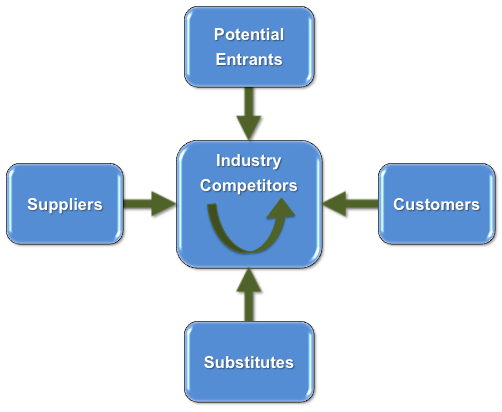Competitive forces have the power to break or make your small business almost overnight. Do you know what competitive forces your small business and it’s industry are under?
In 1979 Michael Porter identified 5 forces, or sources of pressure, that influence competition in an industry and which ‘determine the ultimate profit potential of an industry’. Not only was the model he proposed widely accepted but it is still at the centre of competitive strategy thirty years later.
Potential Entrants
How attractive is your market or industry to potential entrants?
What are the barriers that stop others entering your market? Some examples are:
- Strong brands
- Economies of scale
- Experience in the market
- Large investment costs
What impact will technology have on your market? Technology can lower barriers. It has both created and mortally wounded whole industries. Example: computers appeared and typewriters disappeared.
How does your market defend against new entrants? If they compete on price they may just reduce the overall profit of everyone in your industry. Great for consumers but not so good for business!
Customers
How strong is the bargaining power of your customers? Are there many or few? What would strengthen or weaken their power?
Who are they? Are they part of an increasing or decreasing segment of the population?
Are there switching costs stopping your customers from moving to your competitors? Can you create any yourself? Example: iTunes or ‘buy four coffees and get the fifth one free’.
Substitutes
How great is the threat from substitute products or services that meet the need in a different way? Example: water filters versus bottled water.
Substitutes can appear overnight from a different market and be profitable quickly for the new entrant. Example: a new low cost airlines route for business travel where there was previously only train travel.
Substitutes can be an opportunity for you as well as a threat. Is it possible for your product to be a substitute in someone else’s market?
To defend your business against substitutes try to differentiate between the options available to the customer.
Suppliers
What is the bargaining power of your suppliers? Do they also supply your competitors? Are there alternative suppliers?
Are you subject to switching costs if you move to another supplier?
What is your suppliers long term strategy? Does it include your business or do they want to sell directly to your customers and remove your business altogether?
Industry Competitors
How much rivalry is there among existing firms in your market? Who are they? What are their strengths and weaknesses? What is the basis of competition – price, brand, quality?
Where do you fit in the market? Are you aggressively targeting existing market share held by competitors or trying to increase the overall market by attracting new customers into the market?
Summary
Recognising the ever changing competitive environment in which your small business exists is itself an advantage over your competitors who do not.
It is not just a defence against threats but also a source of opportunities that will help you to set your business free!
© Business Set Free Ltd 2013
This is just one of many articles that you can find at BusinessSetFree.com or click to subscribe to our free e-newsletter.







